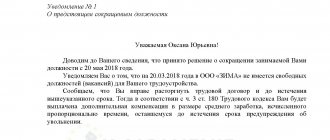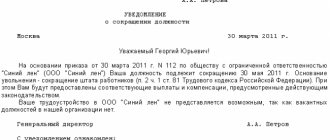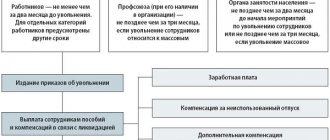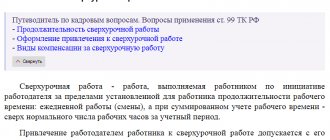What is staff reduction?
Reduction of staff is a procedure for abolishing positions (one or more), carried out in accordance with labor legislation. One of the methods for reducing the number of staff members is to eliminate vacancies. The staffing table is the main evidence confirming the fact of a reduction in the number of employees. If the organization does not have a staffing table, then a payroll or list of employees can also act as a supporting document.
Who gets laid off first and why?
Interesting information
Not only specific positions, but also entire divisions, divisions, and departments may be subject to staff reductions. The employer has every right to do this. However, in both cases, during layoffs, respect for the rights of workers is mandatory, and those who are not allowed to be fired must remain at the enterprise. If entire departments are going to be cut, then employees who have “special” rights should be transferred to other departments.
Let's look at who gets laid off first at work and on what basis. The employer determines preferential rights, and a certain algorithm is provided for this:
- Employees who are prohibited by law from being laid off are excluded from all candidates for dismissal. According to Art. 261 of the Labor Code of the Russian Federation, these include pregnant workers, mothers of children under 3 years of age, single parents with children under 14 years of age or disabled children under 18 years of age, as well as some others. It is prohibited to dismiss employees on maternity leave due to layoffs (Part 4 of Article 256 of the Labor Code of the Russian Federation and Part 6 of Article 81 of the Labor Code of the Russian Federation).
- The remaining workers are assessed on their skill levels and productivity. The comparison is made between employees who occupy the same positions created within the same structural unit. Correctly evaluate the qualifications of two leading accountants working in the same department. It is incorrect to compare a leading specialist and a category 2 accountant - this is indicated in the appeal ruling of the Moscow City Court No. 33-27711/2015 dated 08/06/2015. Similar rules apply to the assessment of labor productivity.
- If the comparison reveals equal levels of qualifications and labor productivity, then family circumstances and other advantages are taken into account when the employee is laid off. There is one exception. If a position is abolished or all staff positions in one position are reduced, then preferential rights are not taken into account. This is indicated in the appeal ruling of the Moscow City Court No. 33-1708 dated January 22, 2015.
The law establishes certain rules regarding the dismissal of an employee. We read about the regulations of the Labor Code on reducing the number or staff of employees.
Legal staff reduction
Russian labor legislation regulates the procedure and determines the grounds for laying off workers. Thus, an employer can fire employees due to a reduction in the number of staff, reorganization or liquidation of the enterprise. In this case, the employer himself determines the optimal number of employees of the organization. By law, the employer is not obliged to justify the decision to dismiss an employee due to reduction, however, formally the procedure must be carried out on the basis of the Labor Code of the Russian Federation (Articles 82, 179, 180, 373). It is possible to dismiss an employee of an organization due to a reduction in the number of employees only if the position he occupies is eliminated.
Additional features
Article 81 of the Labor Code of the Russian Federation contains a list of cases in which it is permissible to lay off an employee at the initiative of the employer:
- absenteeism (absence of a subordinate from work without good reason for 4 hours in a row or during the working day);
- failure by a subordinate to fulfill labor duties without explaining his behavior, and this situation is repeated more than once;
- the appearance of a subordinate at work in a state where he has drunk too much, used narcotic or toxic substances;
- the subordinate does not correspond to the position he occupies or the work performed due to an insufficient level of qualifications (usually this state of affairs is revealed during certification);
- the subordinate committed guilty actions - for example, he stole money from the cash register, revealed a commercial secret of the enterprise.
In the above cases, the employer must respond promptly to the misconduct. You will need to follow the rules for issuing a dismissed work book, salary and other payments due to him.
Thus, when optimizing the company or for other financial reasons, the manager may carry out a reduction in the workforce, in which positions or divisions are eliminated, and many subordinates find themselves without work.
The manager also has the right to reduce the number of subordinates occupying a specific position. The Labor Code of the Russian Federation does not distinguish between the two types of reductions.
At the same time, the legislation protects the rights of persons who have preferential rights to remain at work. If an employer begins to lay off employees who cannot be fired by law, he will be forced to reinstate his subordinates and pay them all compensation.
Unlawful staff reduction
In practice, it is not uncommon to encounter unlawful (imaginary) staff reductions that have no real reason. This procedure is illegal. Employers resort to this method when they need to fire an employee, but there are no real grounds for this. If the procedure for terminating contracts is carried out incorrectly or if it is not observed, the reduction is also considered unlawful. The rights of the dismissed person in this case can be defended in court. However, in practice it is quite difficult to convict employers of illegal actions.
Normative base
The country's legislation clearly states that the managers of a particular enterprise have the full opportunity to determine the number of employees included in the company. Managers' capabilities include both reducing and increasing the number of employees. But such actions must be legally supported, that is, they must be operationally justified.
When eliminating a particular position in a company, it is necessary to draw up an appropriate package of documents, which clearly confirms the reason for eliminating the position and other similar information. A situation of this nature may arise in the process of changing the profile of an enterprise and changing its immediate activities.
If we consider this issue using an example, it turns out like this: the company acquires new equipment, which is designed to make the work of staff easier. Accordingly, the employee is no longer needed and the position as a whole is no longer needed, because the work will now be done by the machine. This point is documented and the position is eliminated.
How to get fired due to reduction
This procedure consists of several stages.
- The launch of the procedure for reducing the number of employees must be formally confirmed by the relevant order and approval of the new staffing table. In this case, the new schedule is approved before the procedure itself is launched. Those employees whose positions are not retained in the new staffing table will be dismissed.
- Article 81 of the Labor Code of the Russian Federation regulates the next stage of the procedure. At least 2 months before the planned date of termination of employment contracts with employees, the employer must send a corresponding notice in writing to the trade union organization.
- At least 2 months before the dismissal of employees due to staff reduction, the employer is obliged to notify the local employment service in writing. The notification must indicate the position, specialty, profession and qualifications of each specific employee. The employment service must be informed about the planned reduction in the organization's staff at least 3 months in advance if the procedure could provoke mass layoffs.
- 2 months before the planned date, the employer must inform its employees about the layoff against signature. When an employee refuses to sign a warning, the HR department draws up a corresponding report.
- The employer must offer employees an alternative - vacant positions in their own or other companies. If vacancies appear in the organization during the warning period, the employer must first offer them to employees who have been laid off. If vacancies appear in the organization within a two-month period, the manager notifies the laid-off employees about this and under no circumstances accepts new ones. When selecting vacancies, the qualifications and health status of the employee must be taken into account. With his consent, the transfer procedure starts. Similar vacancies are offered first. The management of the enterprise has the right to dismiss an employee without warning by prior agreement of the parties, which is drawn up in writing. In this case, the injured party is paid additional monetary compensation, the amount of which is not limited by law and depends only on the agreement on the spot.
- The management of the enterprise issues an order to dismiss employees, indicating the date and reason for termination of the employment contract. Workers get acquainted with him under his signature. If an employee refuses to sign the order, a corresponding act is drawn up.
- Dismissed employees are paid off on their last working day and given a work book with the corresponding entry. When dismissing employees who are members of a trade union, the motivated opinion of this organization must be taken into account (Article 81 of the Labor Code of the Russian Federation, as well as 82 and 373). Dismissal of persons under 18 is permitted with the consent of the state labor inspectorate and the commission for the protection of the rights of minors.
Notice of layoff.
First of all, the employer is obliged to notify employees in advance of the upcoming dismissal.
The notice period depends on the period for which the employer entered into an agreement with the employee:
- 2 months for employees working under an open-ended employment contract;
- 7 days for employees engaged in seasonal work;
- 3 days for employees working under a fixed-term contract concluded for less than 2 months.
Attention!
Natalia
Labor expert
The notice is drawn up in writing and handed over to the employee against signature. If an employee refuses to receive a notice, the employer must draw up a report recording the fact of refusal to receive the notice.
Who should not be fired
In Russian labor legislation there is a list of those employees who cannot be dismissed due to staff reduction. Who can't be fired?
- Women with children under 3 years of age.
- Women on maternity leave (Labor Code of the Russian Federation, Article 256).
- Single mothers with children no older than 14 years old (if the child is disabled - under 18).
- Persons raising children under 14 years of age without a mother (if a disabled child is under 18, Article 261 of the Labor Code of the Russian Federation).
- Employees of organizations who are on vacation or sick leave.
- Minors without the consent of the state labor inspectorate.
Also, according to the Labor Code of the Russian Federation (Article 256), parental leave can be granted until the child reaches 3 years of age at the request of the mother. The workplace and position in this case are retained by the woman.
Is it possible to fire a pregnant woman on the basis of a reduction? Such dismissal is considered illegal. As Article 261 of the Labor Code of the Russian Federation states, dismissal is permissible only upon liquidation of the organization.
The only exception is when the reduction takes place as part of the liquidation of the enterprise.
What categories of workers are not entitled to be laid off by law?
A reduction in staff/number of employees is one of the grounds for dismissal of an employee at the initiative of the employer in accordance with clause 2, part 1, art.
81 Labor Code of the Russian Federation. All stages of this process are strictly regulated by law. Among other things, the law establishes the circle of persons who are prohibited from being laid off. Next - in detail about which categories of workers the law prohibits the employer from laying off.
Pregnant
Women who are expecting a child are under special protection of the state. Expectant mothers are provided with various social and legal guarantees, including a ban on dismissal for any reason, with the exception of cases of liquidation of the enterprise (termination of the activities of an individual entrepreneur) or at her own request.
Pregnancy is confirmed by a medical certificate, which the employer has the right to request, but not more than once every 3 months. If a woman was pregnant at the time of the layoff, but found out about her condition after the fact, she is subject to reinstatement at work, even if the pregnancy did not persist.
For unlawful dismissal of a pregnant woman, the employer faces administrative or even criminal liability (Article 145 of the Criminal Code of the Russian Federation).
Women with a child under 3 years of age
Women who have already given birth cannot be laid off until the child is 3 years old. True, in this case, the number of exceptional situations allowing the dismissal of a woman expands. She can be fired in the following cases:
- Closing an enterprise (stopping the activities of an individual entrepreneur).
- Numerous facts of failure by an employee to fulfill her duties without good reason in the presence of a disciplinary sanction.
- Committing gross violation of labor duties, which include:
- absenteeism;
- showing up at work in a state of alcoholic (drug, toxic) intoxication;
- disclosure of commercial, official or state secrets;
- committing theft, embezzlement or damage to work property;
- violation of labor protection requirements, resulting in an accident, catastrophe or accident;
- committing guilty actions when working with money or commodity valuables, as a result of which trust in the employee was lost.
- If the employee is involved in a corrupt conflict of interest and does not take measures to resolve it.
- Immoral behavior of an employee performing educational functions.
- Providing false documents during employment.
Women on maternity leave
A woman who has recently given birth to a child can go back to work almost immediately , or she can exercise her right to leave first for pregnancy and childbirth, then for child care until the child reaches the age of three (according to Article 256 of the Labor Code of the Russian Federation). Regardless of her decision, such an employee cannot be fired with the wording “due to staff reduction.”
The grounds for dismissal of a woman who has a child under three years of age, in accordance with Art. 261 of the Labor Code of the Russian Federation, there can only be the circumstances stated above (liquidation of the company or guilty actions).
The person who adopted him is also entitled to parental leave for up to three years of age (Article 257 of the Labor Code of the Russian Federation), and it is also not subject to reduction during this period. Fathers and grandparents can also be on parental leave.
Read all about how to reduce your position during maternity leave here.
Single mothers
Single mothers also have state protection during layoffs until the child reaches 14 years of age. The legislation currently does not contain a precise definition of the concept of “single mother”. Explanations about who can be classified in this category when applying labor legislation are given in Resolution of the Plenum of the Supreme Court of the Russian Federation dated January 28, 2014 No. 1.
A single mother is a woman who is practically solely responsible for raising her own or adopted child (children), due to the fact that he never had an official father or he did, but:
- died;
- deprived of parental rights;
- limited parental rights;
- missing;
- declared incompetent (partially capable);
- due to health reasons cannot provide for a child;
- is in prison;
- evades the upbringing and maintenance of the child.
Single mothers of children under 14 years of age can be dismissed only on the same grounds as mothers of children under three years of age. Moreover, if the child is disabled, a single mother cannot be laid off from work until the child reaches 18 years of age.
Single fathers and caregivers
An essentially similar rule of law applies to a single father raising a child under 14 years of age (if the child is disabled, then up to 18 years of age).
That is, a father raising a child whose mother has died, has been declared incompetent, is serving a sentence in prison, or has left the child in an educational or medical institution cannot be fired from work due to a reduction in staff/numbers. He can be fired only upon liquidation of the organization or due to his serious violation of labor procedures or malicious failure to fulfill his duties.
The Plenum of the Supreme Court of the Russian Federation also includes guardians and trustees who are officially recognized as such as persons raising children without a mother. They have the same privileges as a single mother or father.
Sole breadwinners in large families
As you can see, the law provides special guarantees for people with family responsibilities during layoffs. The circle of these persons is clearly defined by Part 4 of Art. 261 of the Labor Code of the Russian Federation is closed, so until recently there were disputes about the position of men supporting large families, because their rights are not specified in the specified list.
The Constitutional Court of the Russian Federation brought clarity on this issue with its resolution of December 15, 2011 No. 28-P.
It established that the guarantee in the form of a ban on termination of an employment contract at the initiative of the employer (except for dismissal in connection with the liquidation of the organization, termination of the activities of an individual entrepreneur or the commission of guilty actions by the employee) also applies to fathers who are the sole breadwinners in families raising at least three young children, in which the mother is a housewife.
Read all about whether a mother with many children can be laid off, and how to do it legally, here.
Employees on vacation or sick leave
Part six of Art. 81 of the Labor Code of the Russian Federation prohibits the dismissal of employees at the initiative of the employer during the period when they are officially ill or on vacation.
In order not to be fired for absenteeism, the employee is obliged to confirm his illness with a certificate of incapacity for work, which is issued in accordance with the order of the Ministry of Health and Social Development of Russia dated June 29, 2011 No. 624n “On approval of the Procedure for issuing certificates of incapacity for work.”
According to clause 11 of this order, during outpatient treatment, the doctor has the right to single-handedly issue such sheets for a maximum period of 15 calendar days. If the patient has not recovered within this period, he is sent to the district clinic, where the decision to extend the sick leave is made by the medical commission.
In some cases, the certificate of incapacity for work can be extended up to 12 months (in case of injury, tuberculosis, after surgery). During this entire period, the patient cannot be laid off from work.
In addition, labor legislation provides for different types of vacations, during which the employee is also not subject to layoffs, including:
- annual basic paid leave;
- various annual additional paid holidays;
- study leave;
- family leave;
- vacation for working pensioners (can a pensioner be fired because of his age?);
- leave for working disabled people;
- leave for participants of the Great Patriotic War;
- leave for parents and wives of military personnel.
Maternity leave for pregnancy and childbirth is also included here - we discussed them above.
Are minors considered exempt from dismissal?
The work of citizens under eighteen years of age is strictly regulated by law and is under increased control.
Thus, it is possible to dismiss a minor in the general manner only upon liquidation of a company or abolition of the activities of an individual entrepreneur (Article 269 of the Labor Code of the Russian Federation).
Article 269 of the Labor Code of the Russian Federation. Additional guarantees for employees under the age of eighteen upon termination of an employment contract
Termination of an employment contract with employees under the age of eighteen at the initiative of the employer (except for the case of liquidation of the organization or termination of activities by an individual entrepreneur), in addition to compliance with the general procedure, is allowed only with the consent of the relevant state labor inspectorate and the commission for minors’ affairs and the protection of their rights.
When reducing the size of an enterprise or its staff, dismissal of such an employee is possible only with the consent of two authorities:
- state labor inspection;
- commission on affairs of minors and protection of their rights.
Preemptive right – what is it and when does it apply?
Speaking about the ban on reduction, it is worth mentioning such a concept as “preemptive right”, which is established by Art. 179 Labor Code of the Russian Federation. Failure to comply may result in unlawful dismissal. When deciding who to lay off first, an employer must compare workers based on their level of productivity and qualifications .
Of course, such an objective comparison is only possible between individuals occupying equivalent positions whose performance results are measurable. If these indicators are the same, the following shall have priority:
- family persons with at least two dependents;
- sole breadwinners in their family;
- workers who improve their skills on the job;
- participants in military conflicts;
- disabled people;
- injured at work;
- compliance with other criteria established by the collective agreement.
Can union members be laid off?
Members of trade unions are more protected than other workers when staff/numbers are reduced, because in order to reduce them, a reasoned opinion of the elected body of the primary trade union organization is required (Article 373 of the Labor Code of the Russian Federation).
If the trade union does not agree to the dismissal of such employees, but the employer does not listen to this opinion and still decides to lay off them, the final verdict is made by the state labor inspectorate.
Who has the advantage
In addition to the list of those who cannot be fired due to staff reduction, the Labor Code also has such a concept as “preemptive right”. According to Article 179 of the Labor Code, this right gives employees of organizations the advantage of maintaining their jobs in case of staff reduction, depending on the quality of their work duties or social reasons. These workers are the last to be laid off.
Employees with a high level of qualifications and labor productivity have priority rights. Work experience and education are also taken into account. Qualification must be confirmed by documents on graduation from educational institutions, certificates of advanced training, extracts from the protocols of commissions on the assignment of a category or rank, etc. To assess the level of qualifications of employees, enterprise management can conduct certification, including unscheduled ones. However, the procedure for conducting such certifications should be reflected in the internal documents of the organization. If all employees have equal qualifications and labor productivity, the manager makes a decision on dismissal together with the trade union organization.
The following employees also have a priority right to retain their jobs:
- Supporting two or more dependents (family circumstances).
- Those who independently support their family (there is no other source of income other than the salary of this employee).
- Those who received injuries or occupational diseases from the employer carrying out the layoff while fulfilling their labor obligations.
- Disabled combatants.
- Improving qualifications without interruption from the work process in the direction of management.
The collective agreement may also establish other categories of employees who have a preferential right to retain their jobs.
Disabled child and parents with many children
Such benefits can be provided to fathers and mothers of disabled children, but until the child turns 18 years old.
When the child is given a corresponding disability benefit, the benefits are withdrawn. Benefits are provided until the child can provide for himself and earn a living. The law also stipulates a ban on dismissing parents who have many children under the age of majority. Article 261 of the legislation of the Russian Federation states that if there are at least three children in a family and the youngest child is under three years old, then the parents must have a job, and they have no right to fire them. This law applies to both natural children and adopted children. After all, on the basis of the law, adopted children receive the same rights as their relatives. Benefits of this type apply to people who have children under 14 years of age, but if the parents are single fathers or mothers.
It is worth noting that a single mother can only be called if the father of the child is not documented . That is, there must be a document that indicates the father’s abandonment of the child. Therefore, the possibility that a woman got divorced or her husband died is not a reason for material benefits.
A woman who is on maternity leave cannot be laid off. The ban on her dismissal is prescribed in Article 261. Moreover, her place must be maintained throughout the entire period of caring for the child, and after returning to work she must be provided with working conditions.
If a person is the only breadwinner in the family, then certain benefits under the ban on dismissal are not provided. But if such a question arises, then it is such an employee who has the right to remain in the workplace. This is justified by the fact that even in the case of difficult family circumstances, they will maintain high labor productivity, because they really need work.
Unfortunately, such benefits do not apply to people who have not reached the age of majority. Article 269 states that employees under 18 years of age are subject to dismissal if so desired by the management of the enterprise. Such representatives may also be subject to layoffs, but only if there is a document from the Inspectorate for the Rights of Minors. This is justified by the fact that immature people are not aware of their rights and managers simply take advantage of this. Such rights may be violated in the event of staff reduction.
The law provides for the possibility of dismissing a disabled person, but this opportunity is provided only in one case. You can dismiss a disabled person if there is a documented medical report. Due to such a medical report, a certain employee is not able to perform the required work due to health reasons. As for the reduction of employees by direct employers, this can be done on an equal basis with other employees of the company.
Features of dismissal due to reduction of pensioners
Often, Russian organizations also employ people who have reached retirement age. However, age is not a reason for primary reduction. Article 179 of the Labor Code states that age can also be an advantage for an employee, since it can be an indicator of high qualifications and productivity.
Article 178 of the Labor Code states that pensioners upon dismissal due to reduction must be provided with all guarantees and payments. Other interpretations of these legislative provisions contradict the principles of equal rights of workers and non-discrimination in the world of work.
Vacation and features of early dismissal
Often at an enterprise, an employee has the opportunity to get vacation every year, and many enterprises provide so-called additional vacation.
Such leaves are distributed according to a regular form and documented. But if a certain employee is laid off, he can be granted leave a little earlier. This will help him take a break from his position and start looking for a new job.
According to the rules established in Article 180 of the Labor Code of the Russian Federation, an employee who has learned that he is being laid off has every right to early dismissal, that is, termination of the employment contract in advance. But this option is used when they have a so-called alternate airfield and can quickly find a new job. Moreover, if another company is ready to hire you, then it will not wait the two months that are agreed upon during the work period in case of being laid off.
Based on the law, in addition to benefits and guarantees, persons who are laid off have the right to receive severance pay. If an employee is unable to find a job within two months, the payment of such benefits is repeated, but the amount is reduced to his average earnings for this position.
And provided that if the employee does not find a new job within a certain period of time and joins the labor exchange, then the direct employer will be obliged to pay this benefit again. This will be presented in a special letter from the employment center.
Payments to those laid off due to redundancy
According to Article 140 of the Labor Code of the Russian Federation, when terminating the employment relationship with an employee, the management of the organization must make a settlement with him and pay all the money due. Payments must be made after the employee submits the corresponding request no later than the next day.
If an employee is fired due to staff reduction, he must receive severance pay, the amount of which is equal to the average monthly earnings. Within two months, the employee is paid severance pay while searching for a suitable job. This payment can be made in the third month if the dismissed employee contacts the employment service within 14 days after termination of the employment contract and does not find a suitable job.
Additional compensation is paid to employees who were laid off without warning and in agreement with the employer. The size of the payment is determined by the amount of average monthly earnings, calculated in proportion to the time remaining before the expiration of the notice period for layoffs. Pensioners, as mentioned above, are paid all compensation, just like ordinary employees. The manager, his deputies, and the chief accountant are paid compensation in the amount of at least three average monthly salaries.
In addition, employees dismissed due to staff reduction are entitled to payment for days worked in the current month and compensation for unused vacation days.
The amount of severance pay may be disputed. In this situation, the organization pays the employee the undisputed portion of the amount. The remaining portion is paid based on an agreement between the employee and management or by court decision.
Basic rights of workers
The staff reduction procedure is characterized by certain features compared to other grounds for dismissal. This is especially noticeable in granting employees certain rights . The main ones include the following:
Receiving advance notice of dismissal
At the beginning of the layoff procedure, the employer is obliged to notify employees in advance.
He must do this no later than two months before dismissal. During this period, all subordinates retain the same working conditions:
- wage,
- the right to sick leave and vacation,
- job responsibilities, etc.
Offering employees a different position
This condition applies in the following cases:
- the reduction is not due to liquidation;
- the employer has available vacancies that it can offer to employees.
Moreover, these vacancies do not at all have to correspond to the previous working conditions or characteristics of the employee (his qualifications, education). For example, a former department head does not necessarily have to be offered a management position. The main thing is that he can perform the proposed work and that it is not contraindicated for him for health reasons or other reasons.
Maintaining the order of dismissal
This means that certain categories of persons specified in the law have the right to preferential retention at work.
Retention of position for certain categories of employees
They are classified as socially protected and are not subject to dismissal due to reduction along with other personnel.
Receiving severance pay
. Its amount is equal to the employee’s average monthly earnings and is calculated based on data on his salary for the previous year.
Receiving additional compensation in case of dismissal before the deadline
With the written consent of the employee or at his request, he may be dismissed before the expiration of a two-month period after receiving notice of the layoff.
In this case, for the period remaining until the end of this period, the employer is obliged to pay him monetary compensation.
It is calculated by multiplying the employee's average daily earnings and the number of days remaining before dismissal.
Receiving salary for the second and third months after dismissal
This right is granted to the employee under the following conditions:
- within two weeks after his dismissal, he registered with the employment service;
- within a certain period he was unable to find a new job.
In this case, it is necessary to provide evidence to the employer’s accounting department confirming that the employee is registered with the employment service and was not employed. The main document in this case will be the employee’s work book.
Respect for the rights of the employee is the main guarantee for the employer that the decision he makes cannot be challenged in court.
In what cases sick leave is not paid - you will find out in our material! What are incentive payments and who is entitled to them? Read more about this in our article. Are you preparing for retirement? Then this material will be useful to you.
Alternative
An alternative to dismissing employees due to layoffs is termination of employment relationships by agreement of the parties. This is, first of all, beneficial for the employer, since he is exempt from paying additional compensation and severance pay, the likelihood of appealing the procedure in court is minimized, and there is no need to notify the trade union or employment service. In addition, the list of those who cannot be dismissed due to staff reduction does not apply to this procedure.
Often employers force their employees to resign of their own free will. Thus, the employee also loses severance pay and compensation that he is entitled to upon layoff.
Employer's liability
Employers are liable if they violate the rules of the procedure for dismissing employees when reducing the number of staff. If payment deadlines are violated, in accordance with Article 236 of the labor law, the employer is obliged to reimburse, in addition to the entire amount of money due to the employee, interest amounting to at least one three hundredth of the refinancing rate of the Central Bank of Russia for each day of delay. The same sanctions apply to employers in case of delay in payment of wages. If the employer does not fulfill the obligation to provide dismissed employees with vacant positions at the enterprise, this threatens him with a fine of 5-50 times the minimum wage in accordance with Article 5.27 of the Administrative Code.
Reduction in headcount or staff - what's the difference?
The labor law does not distinguish between these concepts. And although the dismissal algorithm is the same, there is a difference between these procedures. The lists of those who do not have the right to be reduced by law are the same for both procedures.
A staff reduction is a reduction in staffing levels for a specific position.
| Example The LLC had three accountants; after the reduction in numbers, there was only one staff member left. The position of accountant remains, but the number of employees occupying it has changed. |
Staff reduction means the position itself is abolished.
| Example The institution decided to close the library. Two positions were eliminated - librarian and bibliographer. |
The Labor Code strictly regulates which employees cannot be laid off, regardless of the reasons for the layoff.
What to do when downsizing
If you were laid off due to redundancy, what should you do? You can contact several authorities. To begin with, you can send a written application to the trade union organization of the enterprise. The union must respond to the complaint within a week. An incident of wrongful dismissal due to reduction may be considered by the Federal Labor Inspectorate and the Prosecutor's Office. If the trade union organization and the labor inspectorate do not reveal any violations of the procedure, a lawsuit can be filed. This can be done within a 90-day period from the moment the employee learned of a violation of his labor rights. If the dismissed employee decides to challenge the termination of the employment contract, the statement of claim must be filed within 30 days from the date of issue of the work record book or a copy of the relevant order. Wrongfully dismissed employees do not pay fees and other legal costs. If dismissal due to reduction is recognized as unlawful, the employee is reinstated at his previous workplace by the body that was authorized to consider the labor dispute. In this case, the employee is compensated for the average salary for the period of forced absence or the difference for the period of performing low-paid work, as well as moral damages.
Dismissal due to a reduction in the number of employees in an organization can affect everyone. Therefore, it is so important to know the list of those who cannot be fired due to staff reduction and who have a priority right to retain their job. These issues are fully regulated by Russian labor legislation. An employer's decision to dismiss due to reduction can be challenged both in court and by contacting a trade union, the prosecutor's office, or the Federal Labor Inspectorate. Russian labor legislation regulates the rights of those dismissed due to staff reduction. If difficulties arise, you should seek help from a competent lawyer.
Actions in case of wrongful dismissal
As a rule, HR departments and departments involved in hiring and firing are well aware of those employees who, in accordance with the requirements of labor legislation, are not subject to redundancy. They inform managers about this in order to avoid incidents with regulatory and judicial authorities. If, despite this, the dismissal of an employee belonging to the category of “untouchable” does take place, then his reinstatement in the workplace will be carried out through the court. A wrongfully dismissed employee who is not legally subject to redundancy must take action. First, you should file a complaint about the illegal actions of management with the labor inspectorate or the prosecutor's office. These authorities will check the legality of management’s actions for compliance with the norms of the Labor Code of the Russian Federation. The next step is filing a claim in court. After the court makes a decision declaring the reduction illegal, the employee will be immediately reinstated, since court decisions of this category are those that require immediate execution. He is also required to pay him the money he did not receive due to being forced to not attend work.
The rules for layoffs and who cannot be fired are discussed in this video:
Labor legislation protects the interests of certain categories of persons by establishing a list of citizens who are not subject to reduction. Unlawful actions can be appealed in court. Citizens are subject to reinstatement in their positions with payment of uncollected funds for the period of forced absence from work.











